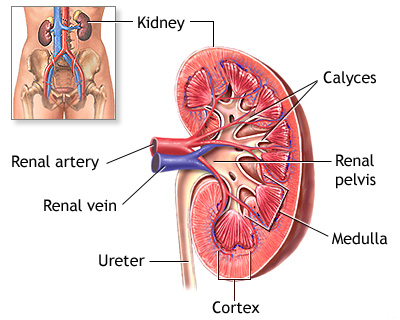Glomerulonephritis
Contents
When to Contact a Medical Professional
Glomerulonephritis is a type of kidney disease in which the part of your kidneys that helps filter waste and fluids from the blood is damaged.
Causes
Glomerulonephritis may be caused by problems with the body's immune system. Often, the exact cause of glomerulonephritis is unknown.
Damage to the glomeruli causes blood and protein to be lost in the urine.
The condition may develop quickly, and kidney function is lost within weeks or months (called rapidly progressive glomerulonephritis).
A quarter of people with chronic glomerulonephritis have no history of kidney disease.
The following may increase your risk of this condition:
- Blood or lymphatic system disorders
- Exposure to hydrocarbon solvents
- History of cancer
- Infections such as strep infections, viruses, heart infections, or abscesses
Many conditions cause or increase the risk for glomerulonephritis, including:
- Amyloidosis
- Anti-glomerular basement membrane antibody disease
- Blood vessel diseases, such as vasculitis or polyarteritis
- Focal segmental glomerulosclerosis
- Goodpasture syndrome
- Heavy use of pain relievers, especially NSAIDs
- Henoch-Schonlein purpura
- IgA nephropathy
- Lupus nephritis
- Membranoproliferative GN

The kidneys are responsible for removing wastes from the body, regulating electrolyte balance and blood pressure, and stimulating red blood cell production.
Common symptoms of glomerulonephritis are:
- Blood in the urine (dark, rust-colored, or brown urine)
- Foamy urine (due to excess protein in the urine)
- Swelling (edema) of the face, eyes, ankles, feet, legs, or abdomen
Symptoms may also include the following:
- Abdominal pain
- Blood in the vomit or stools
- Cough and shortness of breath
- Diarrhea
- Excessive urination
- Fever
- General ill feeling, fatigue, and loss of appetite
- Joint or muscle aches
- Nosebleed
The symptoms of chronic kidney disease may develop over time.
Chronic renal failure symptoms may gradually develop.
Exams and Tests
Because symptoms may develop slowly, the disorder may be discovered when you have an abnormal urinalysis during a routine physical or examination for another condition.
Signs of glomerulonephritis can include:
- Anemia
- High blood pressure
- Signs of reduced kidney function
A kidney biopsy confirms the diagnosis.
Later, signs of chronic kidney disease may be seen, including:
- Nerve inflammation (polyneuropathy)
- Signs of fluid overload, including abnormal heart and lung sounds
- Swelling (edema)
Imaging tests that may be done include:
- Abdominal CT scan
- Kidney ultrasound
- Chest x-ray
- Intravenous pyelogram (IVP)
Urinalysis and other urine tests include:
- Creatinine clearance
- Examination of the urine under a microscope
- Urine for total protein
- Uric acid in the urine
- Urine concentration test
- Urine creatinine
- Urine protein
- Urine RBC
- Urine specific gravity
- Urine osmolality
This disease may also cause abnormal results on the following blood tests:
- Albumin
- Anti-glomerular basement membrane antibody test
- Anti-neutrophil cytoplasmic antibodies (ANCAs)
- Anti-nuclear antibodies
- BUN and creatinine
- Complement levels
Treatment
Treatment depends on the cause of the disorder, and the type and severity of symptoms. High blood pressure may be hard to control. Controlling high blood pressure is usually the most important part of treatment.
Medicines that may be prescribed include:
- Blood pressure medications to control high blood pressure, most commonly angiotensin-converting enzyme inhibitors and angiotensin receptor blockers
- Corticosteroids
- Medications that suppress the immune system
A procedure called plasmapheresis may sometimes be used for glomerulonephritis caused by immune problems. The fluid part of the blood that contains antibodies is removed and replaced with intravenous fluids or donated plasma (that does not contain antibodies). Removing antibodies may reduce inflammation in the kidney tissues.
You may need to limit salt, fluids, protein, and other substances.
Persons with this condition should be closely watched for signs of kidney failure. Dialysis or a kidney transplant may eventually be needed.
Outlook (Prognosis)
Glomerulonephritis may be temporary and reversible, or it may get worse. Progressive glomerulonephritis may lead to:
- Chronic kidney failure
- Reduced kidney function
- End-stage kidney disease
If you have nephrotic syndrome and it can be controlled, you may also be able to control other symptoms. If it cannot be controlled, you may develop end-stage kidney disease.
Possible Complications
- Acute nephritic syndrome
- Blood electrolyte problems
- Chronic kidney disease
- Chronic or repeated urinary tract infection
- End-stage kidney disease
- Fluid overload -- congestive heart failure, pulmonary edema
- Hyperkalemia
- Hypertension
- Increased susceptibility to other infections
- Malignant hypertension
- Nephrotic syndrome
When to Contact a Medical Professional
Call your health care provider if:
- You have a condition that increases your risk of glomerulonephritis
- You develop symptoms of glomerulonephritis
Prevention
There is no way to prevent most cases of glomerulonephritis. Some cases may be prevented by avoiding or limiting exposure to organic solvents, mercury, and nonsteroidal anti-inflammatory drugs (NSAIDs).
Source: http://www.nlm.nih.gov/medlineplus/ency/article/000484.htm

